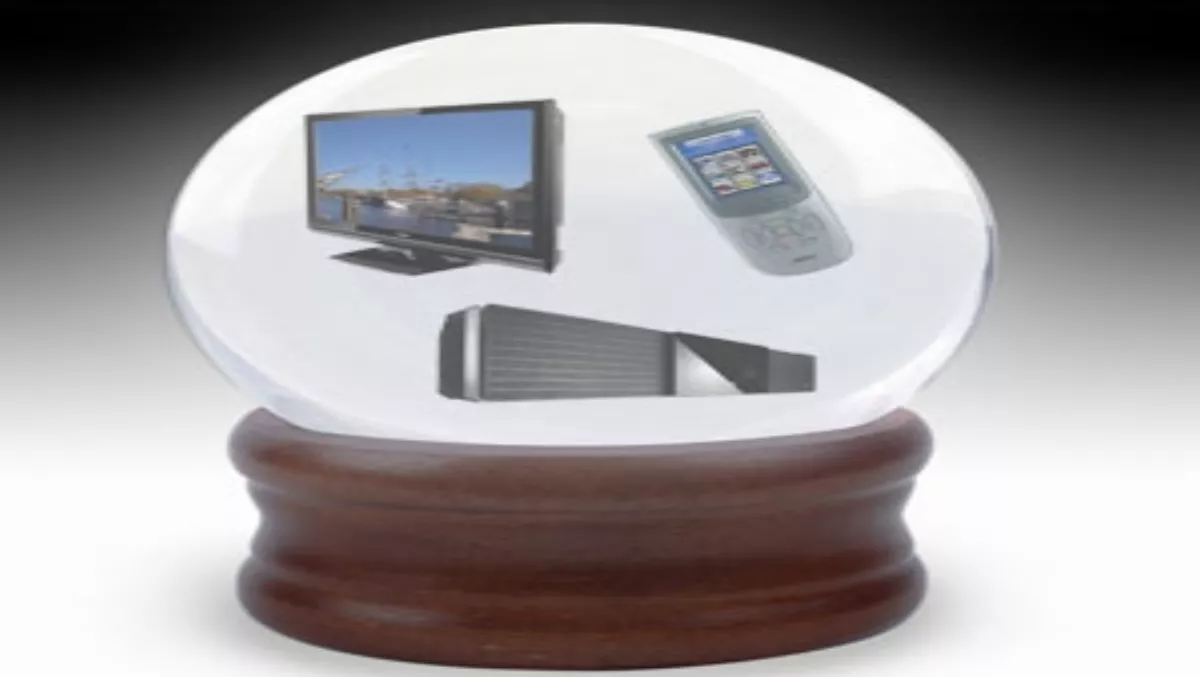
Intel predicts 2011's tech trends - today
With 2010 coming to an end, all eyes must now be focussing on what 2011 has in store. Is the recession really over? Will my IT budget increase? Who’s got the best corporate seats to the Rugby World Cup?
Intel might have the best rugby seats, but they’re not telling us. Instead the company has offered up 12 tech trends it thinks will command your attention throughout the course of 2011.
“New technologies and trends in 2011 will create new experiences for pervasive computing,” said Intel. “As users, we will have a choice among various devices and technologies that provides the best experience for our intended use. Technologies that we see in 2011 will be smarter, more powerful and more useful.”
Here are Intel’s predictions for technology trends in 2011:
Smart TV Experience Gets Real
We expect a large number of TV, digital set-top box and other consumer electronics companies to enter the Smart TV market. By the end of 2011, these companies should be able to gauge the consumer acceptance of Smart TV.
Tablet Mania, “Hybrid-isation”
Tablet computing, in a multitude of form factors and operating systems, will inundate the market. We expect to also see new hybrid devices that provide a combination of the best of netbooks with the best of tablets, like an Intel-based Dell prototype unveiled at the Intel Developer Forum or the new 11-inch Macbook Air.
Strong Laptop Sales
Laptops sales will continue to grow strongly due to a variety of new HD and graphics-related features for consumers including wireless display to beam content to TVs. Enterprise refresh cycles and an improving economy will also support strong laptop sales.
PCs, Smart Devices Gain Senses: Context Aware, Perceptual Computing
Consumers are bound to fall in love with the first wave of context aware or perceptual computers that leverage hard and soft sensor technologies. For example, a mobile device called the Personal Vacation Assistant uses context-aware computing technologies to help get the most out of travel experience. The portable device uses “hard sensors” - cameras that recognise objects and GPS-based information - and “soft sensors” - information that travelers input into the device such as calendar and cuisine preferences - to make on-the-spot recommendations for sights to see, places to eat and more.
Moore’s Law Thrives
New innovations and manufacturing techniques will continue to defy the skeptics who say Moore’s Law is dead. This means that in the coming years, as billions of new devices acquire computing capability and internet connectivity, they will be substantially higher performing with more features embedded in silicon, while also dramatically cutting power consumption and extending battery life.
Securer Security
As IT requirements change rapidly due to an increasingly complex threat landscape and new usage models, including clouds and numerous consumer electronic devices connecting to the internet, security will remain one of the highest priorities for the IT industry. Over the next year, the industry will focus on foundational capabilities for infrastructure protection and maintaining both personal and business secrets. The Intel® Core™ vPro™ processors, Intel’s McAfee acquisition and numerous projects inside and around Intel silicon chips will play roles here.
Consumers Buying Trusted Brands in Uncertainty
Economic uncertainty will continue to be the driving force for a more considered form of consumer consumption and decision-making. The majority of consumers will think twice about what they buy. In spite of this continued state of uncertainty, consumers will likely return to familiar brands because they embody a trusted investment and demonstrate tested quality.
The “Consumerisation” of IT
2011 will mark the point where we see a blurring of consumer devices and enterprise devices. We saw it in 2010 with iPhones and Android phones brought inside the corporate firewall. Employees will want to use their personal solutions for work productivity and employers will want to augment the corporate environment with the devices to drive productivity. Virtualisation, anti-theft technology, remote management and security will be needed to support these devices as they move from home to work .
Smart Signage
Interactive, Minority Report-like digital signs will become widely accepted, featuring new modes of interaction, including face and gesture recognition.
Consumer Revolution On Energy, Environment
Consumers will go from talking about managing their energy consumption to actually doing it with a variety of home energy management devices and services becoming available.
Auto Tech
With sophisticated technologies acting as central nervous systems in today's cars, new in-vehicle technologies are getting and will continue to attract tremendous interest, whether it’s new entertainment features, hands-free voice control of smart phones, other safety technologies or driver functions performed automatically by the vehicle.
Sunny Forecast For Cloud, Virtualised Computing
The enterprise cloud will take off as more cloud-based services are recast for business use, including social networking. With most large corporations plowing through the virtualisation of their environment in 2010, next year will also see build-out of internal cloud solutions. In addition, cloud-based rendering will be done in the cloud and streamed over broadband networks to devices with modest graphics horsepower.

